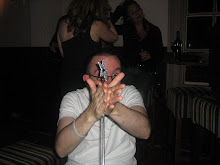As we've seen in the 1950s thus far that the rise of Technicolour and cinemascope meant that a lot of big epics were being made as they now looked spectacular on the screen. Another genre that saw a rise was that of the musical and two big named musicals were nominated for the Best Picture Oscar in 1955 and 1957 respectively. First up is Seven Brides for Seven Brothers a jolly musical film that features plenty of physical violence and the multiple abduction of women by the roguish brothers of the title. It kicks off with Howard Keel's Adam journeying from his mountaintop farm to find himself a wife a task he carries off with ease hooking up with the innocent Millie and taking her back to his house to live with his six brothers. Millie tries to hammer some civility into these boys and it works for a while as she gets them clean and learning proper courtship rituals but when they are provoked at a barn raising contest they lose their temper and get into a fight losing their girls in the process. Adam convinces his brothers to go and kidnap the women and indeed the townsfolk can't rescue them after an avalanche meaning that the girls and Millie end up taking the house banishing the brothers to the stables. However as is often the case the girls soften as the snow begins to thaw and as the title would suggest there is a mass wedding ceremony to end the film. Obviously as you can tell I really wasn't taken with the brutish nature of this film nor did I think that Millie did a particularly good job civilising the men or keeping the women from them. What I did like however were the songs and also the use of Technicolour in particular the pastel colours that the men wore and how they interlinked with the dresses that their intendeds were also wearing. The songs, of which Bless Your Beautiful Hide is the most famous, are also fairly catchy and there are some great little set pieces including the aforementioned barn-raising however as a film I didn't think it was particularly well constructed and I didn't warm to any of the characters.
The same cannot be said for The King and I which makes you feel for even the brutish King of Siam before it comes to its conclusion. This time we find Deborah Kerr as a widowed English teacher travelling to Siam with her young son to become the teacher to the children and wives of the king. Obviously when I think of this film it is Yul Brynner's King who tries to change his attitude to women and his subjects after meeting Kerr's Anna. In the more innocent 1950s I don't think you could use the term sexual tension but that really was what these two displayed as they went on in their shouting matches and eventually came to a mutual understanding. Obviously Anna becomes disgusted after the king won't let his 'present' the young Tuptum leave with her lover so she leaves the king but when he falls ill she journeys back. For me The King and I draws you in with its two lead performances with Brynner winning an Oscar for Best Actor with other awards going to the costumes, music and art direction. Someone who missed out on an Oscar here was Kerr whose strong yet warm Anna anchors the film but then Kerr still holds the record for the most nominations for an actress without a win despite the fact her male co-stars such as Brynner, Frank Sinatra and David Niven seem to come away with the statues. Again there are some great set pieces with Getting to Know You and Tuptum's show for the English being the highlights but for me romance doesn't get any more perfect than Brynner and Kerr's routine in Shall we Dance. Obviously my favourite of the two musicals by a country mile and one that lost out on the Oscar to a film which some say was undeserving but as I'm yet to see it I will reserve my judgment for now.
Subscribe to:
Post Comments (Atom)



No comments:
Post a Comment